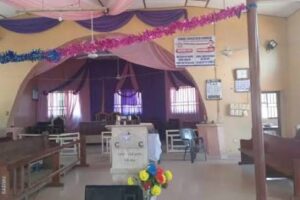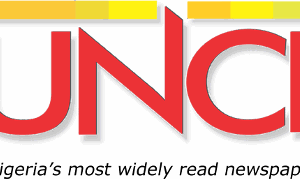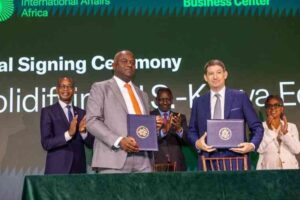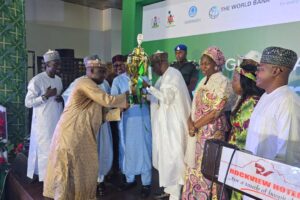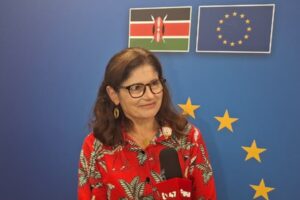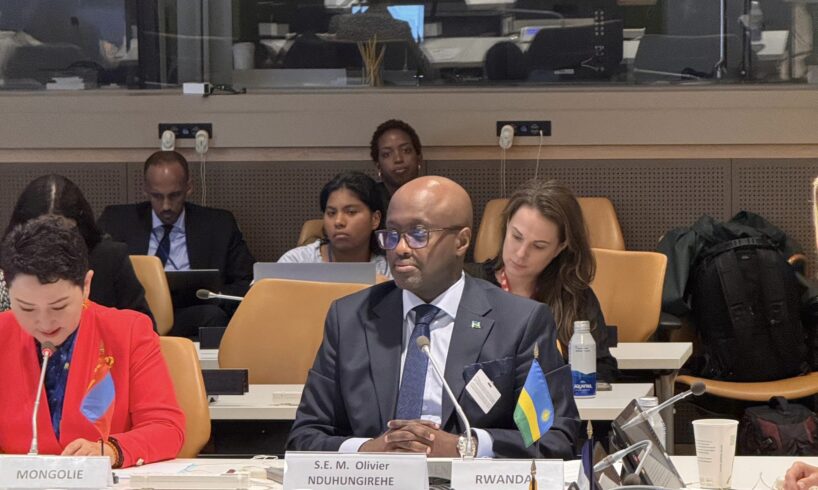
NAIROBI, Kenya, Oct 5 — Rwanda has accused Democratic Republic of Congo (DRC) President Félix Tshisekedi of halting at the last minute the signing of a key Regional Economic Integration Framework (REIF), citing fears of domestic political backlash.
Rwandan government officials said both delegations had finalized the REIF text under US mediation in Washington, D.C., and were scheduled to initial the document before President Tshisekedi abruptly instructed his team not to proceed.
Rwanda’s Minister of Foreign Affairs, Olivier Nduhungirehe, described the decision as politically motivated rather than based on substantive issues.
“The reality is that the DRC and Rwandan delegations did a good job this week and reached an agreement on the REIF under U.S. mediation. They were ready to initial the document the following morning, but President Tshisekedi, at the last minute, instructed his delegation not to sign, fearing negative public reaction,” Nduhungirehe said in a statement.
He dismissed claims that Kinshasa’s refusal was linked to the non-withdrawal of Rwandan troops from eastern Congo, calling such assertions “a ridiculous pretext for media consumption.”
According to Nduhungirehe, security issues are handled separately under the Joint Security Coordination Mechanism (JSCM), which met in Washington on September 17–18 to discuss the implementation of the regional security plan known as CONOPS.
“Negotiations on the REIF are purely economic and do not consider security matters, which are handled by the JSCM,” he added.
Frequent last-minute reversals
The minister also accused President Tshisekedi of frequent last-minute reversals on key peace and security issues, citing similar actions during the Luanda peace process in 2024.
“On 14 September 2024 in Luanda, Angola, the DRC military delegation had already approved the Harmonized Plan for the neutralization of the FDLR and the lifting of Rwanda’s defensive measures, ready to be signed by ministers. President Tshisekedi suddenly changed his mind, called his Foreign Minister during our meeting, and instructed her not to sign,” Nduhungirehe recalled.
Rwanda’s Government Spokesperson, Yolande Makolo, expressed similar concerns, saying Kigali was “puzzled” by the DRC’s sudden withdrawal.
“The Rwandan delegation in Washington, D.C., was ready to sign the REIF, which benefits both our countries and the region. We are puzzled by the DRC’s last-minute decision not to sign, given the positive atmosphere and diligent mediation by Senior Advisor Massad Boulos and the U.S. State Department,” Makolo said.
She emphasized Rwanda’s continued commitment to both the peace agreement and the US-mediated economic framework, describing them as “vital for stability and prosperity in the Great Lakes region.”
“Rwanda believes in the peace agreement and the U.S. mediation approach, and we hope the REIF will eventually be signed. The peace process must succeed—it is the best chance for stability and economic development in our region,” she added.
Withdrawal of Rwandan troops
According to Reuters, Congolese officials withheld their signatures pending the withdrawal of 90 per cent of Rwandan troops from eastern Congo—a condition reportedly tied to the broader peace deal signed in June under Washington’s mediation.
One source told Reuters that “Kinshasa was unwilling to sign” and that “they’re going to have to get Trump on the phone,” referencing US President Donald Trump, who has personally championed the peace initiative.
The Joint Oversight Committee (JOC)—established under the June 27 peace accord—held its inaugural meeting in August in Washington, D.C., to coordinate implementation and resolve disputes.
The JOC brings together representatives from Kigali and Kinshasa, alongside observers from the United States, Qatar, Togo, and the African Union Commission.
At the meeting, the two sides adopted terms of reference, reviewed progress, and laid the groundwork for further security coordination through the JSCM.
Back in Africa, regional leaders have continued efforts to align the Nairobi and Luanda peace processes with the Washington-brokered framework.
AU-led peace drive
On August 1, the EAC and SADC resolved to consolidate all ongoing peace efforts in eastern DRC into a single, unified African-led initiative.
The resolution was reached during a high-level co-chairs’ meeting in Nairobi, co-chaired by President William Ruto and President Emmerson Mnangagwa of Zimbabwe, under the African Union (AU).
“Today marks a turning point. There is now one African-led process that brings together all other initiatives—Nairobi, Luanda, and others—into a single coherent mechanism on the situation in eastern DRC,” President Ruto said.
Trump, who has described the initiative as a “glorious triumph” for the Great Lakes region, aims to pair peacebuilding with Western investment in the DRC’s vast mineral wealth—including cobalt, lithium, copper, and gold.
Despite diplomatic optimism, fighting continues in eastern Congo, where Rwanda-backed M23 rebels have seized major cities, displacing hundreds of thousands.
The UN Group of Experts recently reported extensive coordination between M23 and the Rwanda Defence Force (RDF)—claims Kigali denies, insisting its troops are deployed only to contain the FDLR, a militia linked to the 1994 genocide.
In his address at the United Nations General Assembly (UNGA) in New York on September 23, President Trump singled out the DRC-Rwanda conflict as one of the “seven un-endable wars” he had helped stop.
“I ended seven wars, and in all cases, they were raging, with countless thousands of people being killed. This includes Cambodia and Thailand, Kosovo and Serbia, the Congo and Rwanda, Pakistan and India, Israel and Iran, Egypt and Ethiopia, and Armenia and Azerbaijan,” Trump said.

